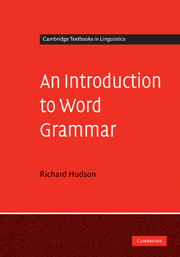11 - English syntax
Published online by Cambridge University Press: 05 June 2012
Summary
Dependencies
Summary of Section 7.1:
• Traditional syntactic relations, like other such relational concepts, are organized in an open-ended taxonomy rather than drawn from a supposedly small and universal set.
• They are dependencies because they provide unequal relations between individual words: a dependent and its parent.
• A dependent is subordinate to its parent because it makes the parent's meaning more precise.
• Dependency analysis contrasts with the dominant approach in modern syntax, phrase structure, for which the basic relations are part–whole relations to phrases rather than traditional syntactic relations. Dependency analysis is preferable because it rests on firmer psychological assumptions and produces simpler analyses.
• One particularly important benefit of dependency analysis is the notion of dependency distance, based on the number of words between a word and its parent, which correlates with independent measures of memory load.
• The traditional grammatical relations subject and object are concepts which are clearly defined by a bundle of properties.
• The logic of inheritance explains why languages distinguish valents, inherited from both dependent and parent, from adjuncts, inherited only from the dependent.
Since dependencies are the basis of syntax, we now ask which dependencies are needed for English. Novices may prefer to read 11.1.3 (page 283) first.
Our starting point is the set of general dependencies displayed in Figure 7.4 which contrasts valents and adjuncts. Since this contrast is rooted in the logic of inheritance, which applies to all languages, we may expect it to have some relevance in every language, though the details are bound to vary from language to language.
- Type
- Chapter
- Information
- An Introduction to Word Grammar , pp. 279 - 316Publisher: Cambridge University PressPrint publication year: 2010

